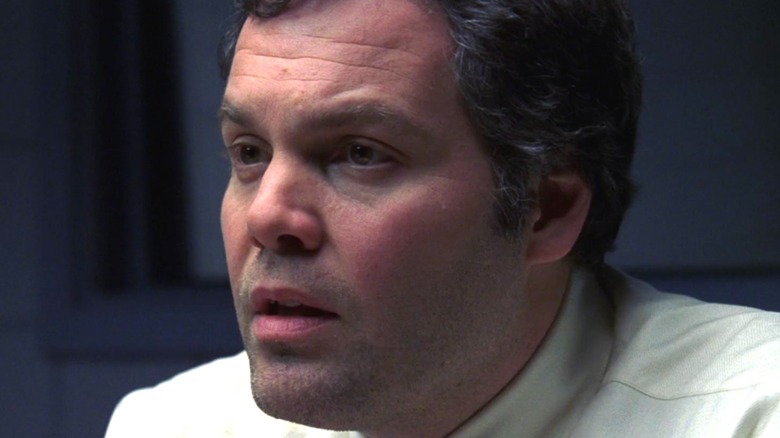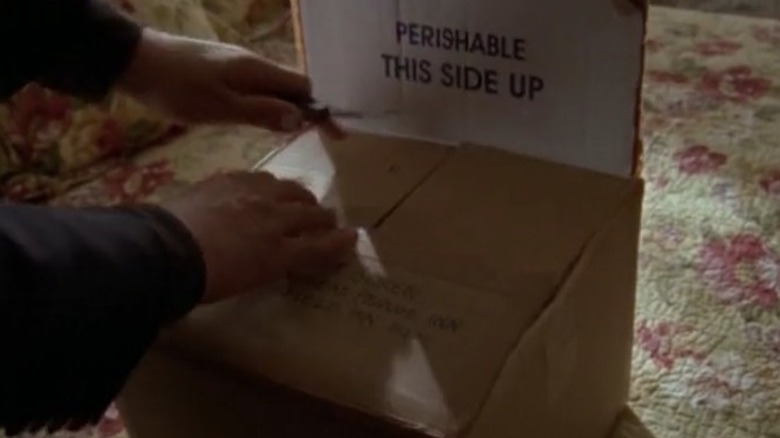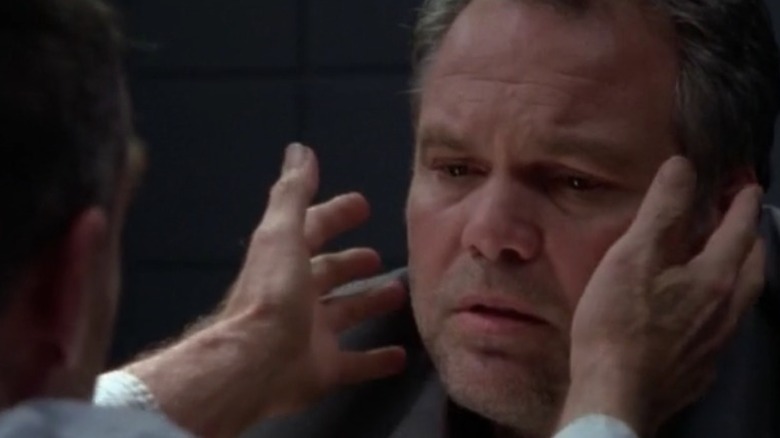The Most Jaw-Dropping Moment From Law & Order: Criminal Intent
In the decades since Dick Wolf's original "Law & Order" first debuted on NBC, it has not only spawned a litany of spin-offs (some more successful than others) but also managed to remain as relevant as ever thanks to its ability to reflect society's most heated debates involving both the justice system and high-profile cases. In addition to relying on ripped-from-the-headlines plots for ratings, at least part of the franchise's success comes from its always dramatic focus on a variety of beloved detectives' personal and emotional lives.
This is as true for "Law & Order: Criminal Intent" as it is for the universe's most successful series, "Law & Order: SVU." In fact, one could argue that the only detective who rivals the "SVU" leads in terms of his forever being "too close to the case" is Vincent D'Onofrio's emotionally tormented Detective Robert Goren on "Criminal Intent." Over the course of his ten-season run on the spin-off, the penetrating and idiosyncratic detective takes his fair share of hits. Despite his strained relationships with both his terminally ill mother and his addict brother, their deaths take a massive toll on Goren, as does his tumultuous and borderline romantic push-pull relationship with supervillain Nicole Wallace (Olivia d'Abo). Goren finding out he is the biological son of serial killer Mark Ford Brady (Roy Scheider) certainly doesn't help matters, nor does his traumatic undercover stay in a criminally irresponsible and abusive psychiatric ward of a prison.
There's one episode, however, that darn near strains credulity with its cruel and unusual treatment of the dogged detective, and it contains one of the series' most jaw-dropping moments.
In the episode "Frame," Goren and Eames make a gruesome discovery
In Season 7, Episode 22, audiences learn that Goren has never seen the movie "Se7en" — or, if he has, that he didn't learn anything from its notoriously shocking finale. The episode (titled "Frame") sees detectives Goren and Eames (Kathryn Erbe) struggle to track down a killer who knows so much about Goren's personal and familial life that they're able to make it look as though the detective himself is behind two murders. The fan-favorite "Frame" (via Reddit) begins on a tragic note, with Goren finding out that his brother has been murdered, and proceeds to spiral from there as the mysterious puppet master continues to plague and gaslight the detective.
In the episode's most graphic emotional gut-punch, Goren and Eames come across a cardboard box addressed to the latter. Rather than wait for backup or someone with some semblance of suspicious package training, Goren whips out his box cutter and dives right in. The box, marked "PERISHABLE," contains a rather realistic-looking human heart, one that franchise-wide M.E. Dr. Elizabeth Rodgers (Leslie Hendrix) will later verify is not only real, but belongs (or, belonged) to Nicole Wallace.
For all its dead bodies and graphic talk, "Criminal Intent" rarely lingers on an image containing as much abject gore as that of Goren's horrifying mystery package. But the shocking anomaly of an image alone doesn't entirely explain the episode's 9.1 viewer rating on IMDb. In the episode's final scenes, an already jaw-dropping moment is made even more unbearable when it's revealed to have stemmed from a betrayal that's at once startling and horrifically sad.
Frame piles on the shock and tragedy in its final scenes
Ultimately, we learn that the person behind the episode's tragic, gruesome, and melodramatic deaths is none other than Goren's life-long mentor, Declan Gage (John Glover).
For years, Declan was the father figure Goren never had, one of the few people in his life whose genius rivaled that of his own, and someone on whom Goren could actually, consistently rely. Naturally, the already heartbroken detective is left desolate by his former mentor's betrayal. But what makes Declan's actions most difficult to swallow is the fact that, in his mind, he genuinely thought he was helping his protégé. "I wanted you to have a clean slate," Declan says of killing two of the most important people in Goren's life.
Even more tragic (yes, there's more), the only reason Declan thinks and does any of this is that he actually isn't in his right mind. In his interrogation of the professor, Goren discovers that Declan's executive function is fast-diminishing and that his frontal lobe has been "blown out." In a way, Declan's lack of capacity to form intent makes the betrayal all the more difficult to take. The man sitting before the detective in the interrogation room — the man who sent him Nicole Wallace's heart in a box — is no longer the man Goren so loved. In a single episode, Goren is thus forced to mourn not only his brother and long-time fascination, but the still-living mentor he once knew and relied upon, as well.


